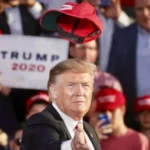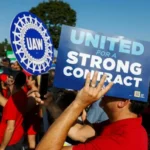The United Auto Workers on Friday formally challenged last week’s election loss at a pair of Mercedes-Benz facilities in Alabama, accusing the company of engaging in “an unprecedented, illegal anti-union campaign” and requesting a new vote.
“All these workers ever wanted was a fair shot at having a voice on the job and a say in their working conditions,” the UAW said in a statement. “And that’s what we’re asking for here. Let’s get a vote at Mercedes in Alabama where the company isn’t allowed to fire people, isn’t allowed to intimidate people, and isn’t allowed to break the law and their own corporate code, and let the workers decide.”
Of the more than 5,000 employees at the two Mercedes-Benz United States International (MBUSI) plants, 2,045 (45%) voted to join the UAW and 2,642 (56%) voted against it. After the ballots were counted, union president Shawn Fain said that it was “obviously not the result we wanted” but “we’ll be back.”
The UAW complaint to the National Labor Relations Board (NLRB) accusing MBUSI of “wanton lawlessness” echoes the union and workers’ previous allegations that the company engaged in illegal union-busting at the Vance and Woodstock facilities, which led to ongoing reviews from U.S. and German authorities.
“The employer engaged in a relentless anti-union campaign marked with unlawful discipline, unlawful captive audience meetings, and a general goal of coercing and intimidating employees.”
“On January 11, 2024, employees of MBUSI publicly announced that they were exploring forming a union with the UAW at MBUSI’s facilities,” says the new complaint, according toAlabama Reflector. “Almost immediately thereafter, both prior to and during the election period, the employer engaged in a relentless anti-union campaign marked with unlawful discipline, unlawful captive audience meetings, and a general goal of coercing and intimidating employees who were attempting to exercise their Section 7 rights.”
The Reflector reported that “the charges include disciplining employees for discussing unionization at work; not allowing union materials or paraphernalia to be distributed; surveilling employees; discharging supporters of the union; forcing employees to be in captive audience meetings, and making comments that union activities will not work.”
MBUSI has denied any wrongdoing and a company spokesperson said Friday that “our goal throughout this process was to ensure every eligible team member had the opportunity to participate in a fair election.”
“We sincerely hoped the UAW would respect our team members’ decision,” the MBUSI spokesperson added. “Throughout the election, we worked with the NLRB to adhere to its guidelines and we will continue to do so as we work through this process.”
Lisa Henderson is the NLRB’s regional director responsible for the complaint. The agency confirmed to CNBC that her office is still investigating the earlier accusations against MBUSI and received the new filing. As the outlet detailed: “If she finds that the objections raise substantial and material issues of fact that could be best resolved by a hearing, she will order a hearing. If after the hearing, she finds that the employer’s conduct affected the election, she can order a new election.”
Although leading public figures—from Republican Gov. Kay Ivey to retired University of Alabama football coach Nick Saban—battled the UAW push, organizers had high hopes going into last week’s vote, which came after a victory at a Volkswagen facility in Chattanooga, Tennessee last month and union workers winning new contracts at the “Big Three” following a six-week strike last year.
Reflecting on the initial outcome in Alabama, Dave Kamper, senior state policy strategist at the Economic Policy Institute, wrote Wednesday that “while this result shows the power of corporations and state governments to smother worker efforts to unionize, even in defeat the UAW helped Mercedes workers win substantial improvements in pay and benefits.”

“Workers organizing to improve their working conditions benefit from unions in many ways, but even when a union victory eludes them like in Alabama, the organizing can pay off,” he stressed. “The more workers band together to fight for better jobs, the more likely they and other workers will see the benefits.”










